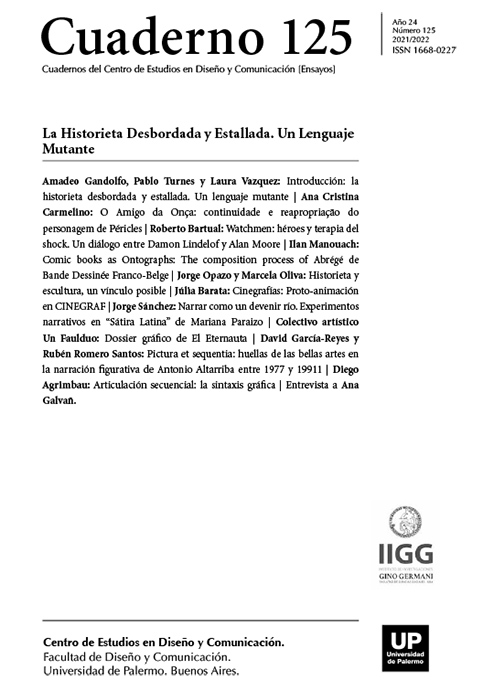Watchmen: héroes y terapia del shock. Un diálogo entre Damon Lindelof y Alan Moore
Abstract
The article aims to establish a dialogue between Watchmen, the comic by Alan Moore and Dave Gibbons, and its television sequel, produced under the creative direction of Damon Lindelof. This dialogue is established on the political content of both works, specifically in their critique of neoliberalism as a political and economic regime. We argue that the thematic and narrative space of both the comic and the series is similar because both construct their narration as a critique of this set of ideas, and that their differences stem from the way in which they link and comment on the changes experienced by neoliberalism over 30 years. Finally, we propose an anarchist interpretation of both works.
References
Amacker, K. y More, A. (2012). “Interview with Alan Moore”, en Seraphemera: Books and Music. En línea en: http://www.seraphemera.org/seraphemera_books/AlanMoore_Page1.html
Bastién, A. J. (2019). “Damon Lindelof knows exactly what happens after Watchmen’s cliffhanger finale”, en Vulture, 15 de diciembre. En línea en: https://www.vulture.com/2019/12/watchmen-finale-damon-lindelof.html
Brenan, G. (1962). El laberinto español. París: Ruedo Ibérico.
De Ory, C. (2019, 19 de septiembre). “Primero estaban los tartesios, que eran españoles…” [Tweet] En línea en: https://twitter.com/Camilo_de_Ory/status/1141249484690808832
Epstein, A. (2019). “HBO’s Watchmen is great. Its comic creator Alan Moore wants nothing to do with it”, en Quartz, 22 de octubre de 2019, en linea en: https://qz.com/quartzy/1732050/why-alan-moore-wants-nothing-to-do-with-hbos-watchmen/
Friedman, M. (2005). “The promise of vouchers”, en The Wall Street Journal, 5 de diciembre de 2005.
Golding, W. (1954). Lord of the Flies, Londres: Faber and Faber.
Klein, N. (2008). La doctrina del shock. El auge del capitalismo del desastre, Buenos Aires: Paidós.
Lindelof, D. (2019). Watchmen, HBO.
Moore, A. y Pindling, L. (2008). “Alan Moore video interview”, Street Law Productions, en línea en: https://alanmoorecomics.wordpress.com/video-interview-live-and-uncut/
Moore, A. (2016). Jerusalem, Londres: W. W. Norton & Company.
Peña Vidal, J. (2002). Poética del tiempo: ética y estética de la narración, Santiago de Chile: Editorial Universitaria.
Reppion, J. (2019, 17 dic.). “Everyone please stop saying they think Alan Moore would probably actually love the new Watchmen TV series. It’s like saying you think someone would really like what their burglars did with the furniture they stole. ‘Their living room looks great, and it’s very much his style’” [Tweet] En línea en: https://twitter.com/johnreppion/status/1206862582600089601
Rose, S. (2009). “Alan Moore: an Extraordinary Gentleman”, en The Guardian, en línea en: https://www.theguardian.com/books/2009/mar/16/alan-moore-watchmen-lost-girls
Sepinwall, A. (2019) “Damon Lindelof Unpacks Mysteries of the ‘Watchmen’ Finale”, en Rolling Stone, 15 de diciembre. En línea en: https://www.rollingstone.com/tv/tv-features/watchmen-finale-lindelof-interview-925847/
Wilson, J. (2020). “Disinformation and blame: How America’s far right is capitalizing on coronavirus”, The Guardian, 19 de marzo. En línea en: https://www.theguardian.com/world/2020/mar/19/america-far-right-coronavirus-outbreak-trump-alex-jones
Los autores/as que publiquen en esta revista ceden los derechos de autor y de publicación a "Cuadernos del Centro de Estudios de Diseño y Comunicación", Aceptando el registro de su trabajo bajo una licencia de atribución de Creative Commons, que permite a terceros utilizar lo publicado siempre que de el crédito pertinente a los autores y a esta revista.


